- Home
- Mike Lupica
Fantasy League Page 2
Fantasy League Read online
Page 2
“Woman friend,” she said. “If it was a date, I would have told you it was a date.”
“Dating is good,” Charlie said.
His mom made a snorting sound. “You try it sometime.”
He smiled at her and said, “I liked that last guy.”
“Not as much as he liked himself.”
“You know how you’re always telling me you want me to have a great life?” Charlie said. “I want the same for you.”
“I don’t need a man in it to get there,” she said. “It just took me a while to figure that out.”
They had spent the day together, his mom taking him to a location shoot of a new action movie starring Vin Diesel about some former L.A. cops who end up saving the city from the bad cops now running the police department. Karla Gaines would do that sometimes, to get Charlie into her world for a little while.
And, just maybe, get him interested in something other than football.
So they’d been in downtown Los Angeles for what was one of the last days of shooting, at Alvarado Street, near Dodger Stadium, watching this great chase scene between police cars and Diesel. Two police cars crashed into each other, one blowing up in front of Charlie’s eyes. Charlie’s mom tried to explain where they were in the story before realizing that Charlie had stopped listening.
He was staring at one of the actors who’d just been running down the street.
“Do you know who that is?” Charlie said.
“Let me guess . . . Is he the one who used to play football?”
“He is Jack Sutton, Mom,” Charlie said. “He didn’t just use to play football. He was known as Sack Sutton when he was the best linebacker on the entire planet, before his knee exploded like that fake cop car just did.”
“How could I not have known these things?” she said.
“Seriously? How could you not tell me he was in this movie? Did you see him go flying around that corner? Holy moly, he looked like he did when he was still playing, when you thought Jack Sutton could outrun cars. That was before his knee. When he retired, he said he’d probably be limping for the rest of his life.”
His mom smiled. “I’m sure the producers will be very excited to hear useful information like that.”
“He even looks the same as he did when he was playing,” Charlie said. “Same crazy long hair.”
“He’s kind of cute,” Charlie’s mom said.
“Ewwww, Mom.”
“Just sayin’.”
“Sack Sutton,” Charlie said. “Unbelievable.”
“What is unbelievable,” Charlie’s mom said, “is that now I can’t even escape football at work. And you can’t escape it even for an hour.” She sighed. “Oh well, may as well make the best of it.”
She walked him across Alvarado then, introduced him to Jack Sutton, who used to get into so much trouble off the field, had been suspended so many times, that he’d never played even one full sixteen-game season. That was before he wrecked his knee, getting hit low and hard after he’d made an interception.
Charlie’s mom told Jack Sutton that her son was the star of his fantasy leagues. Jack shook Charlie’s hand and said, “I’m doing a different kind of fantasy now. And get to be a rookie all over again.”
“Fourteen and a half sacks your rookie year with the Jags,” Charlie said.
“You remember the half? Not bad, kid. They didn’t officially give it to me until the next year.”
“The boy’s pretty smart about football,” Karla Gaines said.
“Wish I’d been smarter,” Jack Sutton said.
“I’d like to know what you just ran in the forty,” Charlie said.
“Too little, too late,” Sutton replied. “Now, if you’ll excuse me, it’s time I got back to my new day job.”
• • •
Later, Charlie was in the den at Anna’s house, having told her he couldn’t believe he got to meet Sack Sutton. Anna remembered that the Bulldogs had almost drafted him out of Miami, but passed because he was such a total wild man, her uncle Matt turning out to be right for once.
“He’s actually been right pretty often,” Charlie said.
“Not nearly often enough.”
Their game was starting at six o’clock L.A. time. It was one of the best parts about being a football fan on the West Coast, night games starting this early. It was even better during the regular season, getting to watch the one o’clock games in the East at ten on Sunday morning. It almost made Charlie feel as if he were seeing the games before anybody else did, like he was getting a jump on the whole country.
The plan tonight was to watch the first half and then squeeze in burgers at halftime, Anna promising they wouldn’t miss a down. Her mom and dad would be watching the game, too.
Anna and her parents went to all Bulldog home games, watching them from her grandfather’s private suite. Sometimes they’d even catch a road game, Anna either flying on a private jet with her grandpa, or on the team’s family plane.
It was no great secret at Culver City Middle who Anna was, or that she came from a rich family. Very rich. Even for L.A. The Warren family, Charlie knew from his mom, had made about ten fortunes in Los Angeles real estate, going all the way back to Anna’s great-grandfather. But Anna and her family didn’t live rich, which was why she didn’t grow up in Beverly Hills, or Bel Air, or Malibu.
Anna’s dad worked at Sony Studios, the same as Charlie’s mom, but in the public relations department. Charlie’s mom had always told him there were only two main groups of people in Los Angeles: Those who worked in the “industry,” which meant the movie industry. And those who knew somebody who worked in the industry.
So Charlie and Anna both had parents working in the industry, but Charlie never thought of Anna that way; she came from the only business that interested him: the football business.
“You know why I like you so much?” Anna was saying to him as the two of them watched the pregame show.
“Because I make you look like you’re the genius in your own fantasy leagues?”
“No, it’s not that . . . and I don’t need you to make me look like a genius,” she said. “Though I have to say you do have a better brain for football than my uncle.”
“I can hear you, you know?” Anna’s mom said from the next room.
“It’s true,” Anna called back to her.
“Remember that you love your uncle and he loves you, too,” her mom said.
Anna said to Charlie, “I’d love him a lot more if our team would win some games once in a while.”
“Still hearing you!”
Anna smiled at her mom, even though Molly Bretton couldn’t see her. “Having a private conversation here!”
Anna had long dark hair and brown eyes, and though she wasn’t as tall as Charlie, she had long legs. There were about seven hundred girls at Culver Middle, but Charlie didn’t think one of them was prettier than Anna Bretton.
Only she never acted as if she knew how pretty she was, the way she never made a big deal—any deal at all, really—about being a Warren. But she did love having a football team in the family. Even a bad one. And loved that team as fiercely as Charlie did. Maybe that was why they got along as well as they did. Anna had plenty of girlfriends at school, from her class, from her soccer team, from the tennis team. But she always seemed happier with Charlie and with guys who loved sports the way she did.
“What was I saying before”—she raised her voice now—“my mother rudely interrupted us?”
“You were about to explain why you practically worship the ground I walk on,” Charlie said. “Or something along those lines.”
“In your dreams.”
“And you might have thrown in something about my good looks, probably, and amazing sense of humor.”
“Aren’t you leaving out modesty?”
“
I’m much too modest to include that.”
“Anyway,” Anna said, “the reason I like you is because you never treat me differently or like I’m some kind of freak just because my gramps owns the team.”
“That’s because you don’t act like one,” Charlie said, grinning at her. “Freak or geek.” In a quiet voice he added, “Nobody likes to be thought of as a freak.”
“Wow,” she said, grinning back. “Thanks for the compliment. Woo hoo! Anna Bretton . . . not a freak!”
“What I mean is that you don’t act like you think you’re some kind of celebrity even though other kids at school treat you like one.”
“My parents want me to live a normal life,” she said, putting air quotes around normal. “Or as normal as you can in L.A.”
“Except when you watch from the suite in the stadium that your gramps built.”
Bulldogs Stadium, downtown, next to the convention center.
“Oh, that silly thing?” she said.
“Just sayin’ that I like you, too. Doesn’t hurt that you love football the way I do.”
“And know as much!”
“Almost as much.”
This was a game they played all the time, like a song whose words they both knew by heart.
“As much,” she said.
“If you know as much,” Charlie said, “how come you need me to win your leagues?”
“You know I could do it on my own if I really wanted to.”
“Really?” Charlie said.
“One of these years I just may have to prove to you I can,” she said.
“How about this year?”
“Shut up,” she said.
“Look at it this way,” he said. “You’re way better at real sports than I am.”
Tennis was her best. She’d been competing in tournaments since she was seven. She was also the best soccer player on her team, and would threaten every year to go out for the boys’ team, just to prove that she could make it.
“You’re not as pathetic at football as you say you are,” Anna said. “Or have convinced yourself you are.”
They were about five minutes from kickoff.
“Not as pathetic as the Bulldogs,” she added.
“Maybe they’ll surprise us this season.”
“How? Gramps told me he may have to buy up tickets himself so the opener isn’t blacked out. Like, a lot of tickets.”
It was a league rule. If you didn’t sell out a home game, the game couldn’t be shown on a local television station. Anna’s grandfather had done it a few times last season, including for the home opener, but had finally given up. By December there were just too many empty seats. Those empty seats as much a symbol of what the Bulldogs had become as anything else.
Another way for people in the media, even the ones who seemed to want the team to do well, to say that pro football still hadn’t come back to Los Angeles.
Anna said, “Gramps’s whole life, all he wanted to do was own a football team in L.A. He had chances to buy other teams. But he wanted one here, because he grew up and lived his whole life here. He finally gets one, even willing to build a stadium himself, and now he has to sit in that stadium and watch it empty out by December like it’s some kind of fire hazard.”
“Couple of really good drafts would turn everything around,” Charlie said.
“Only if they were like your drafts.”
“I draft guys off what they’ve done in the pros,” Charlie said. “Your uncle drafts college guys and hopes they might do something. It’s not an exact science.”
“If it was science,” she said, lowering her voice, “he’d flunk.”
It wasn’t as if Matt Warren was wrong about all the guys he’d drafted. But it seemed like when he took an offensive guy, the defensive guy he passed up would become a star. Or he’d pick up a defensive guy and watch the next season as the running back he could have taken rushed for a thousand yards somewhere else.
And he still hadn’t found the right quarterback for a quarterback’s league.
The Bulldogs had been 4–12 the past two seasons and were going to be lucky to be 4–12 again this season. Fans weren’t stupid. They were smart enough to know that this season was probably going to look a lot like all the others for the L.A. Bulldogs, smart enough to know why there would probably be more empty seats than fans again by season’s end.
Bulldogs Stadium was not really a fire hazard. Just a football hazard.
“It’s killing Gramps,” Anna said. “But it would kill him even more to do what he ought to do.”
“Which is what?”
“You know what. Fire my uncle.”
“Anna Warren Bretton!” her mom said, standing in the doorway with guacamole and chips.
Even Charlie knew it was never good when her mom used all three names.
“We don’t talk about family that way and you know it, young lady.”
Young lady. That was never good, either.
“I’m right, Mom, and you know it.”
“I don’t know anything of the kind. We all knew going into this, starting with your grandfather, that it was going to take time to build a winner.”
Charlie was looking at Anna now, seeing a face he’d see from her on the soccer field, or in a close tennis match. He called it her don’t-mess-with-me look.
“It would be nice if that happened while my grandfather was still alive,” Anna said.
“Your grandfather isn’t going anywhere.”
Anna turned back to the screen as the Bears lined up to kick the ball off.
“He isn’t going anywhere and neither is our team,” Anna said to her mom.
Then she asked if she and Charlie could go upstairs and watch the game in her room.
“So I won’t distract the two of you?” Molly Bretton said.
“Something like that.”
“Thanks for not sugarcoating it,” her mom said. “You can bring the chips and dip up, just don’t make a mess. Your dad will have the grill fired up and the burgers ready to go at the half.”
“Hope our team hasn’t made me lose my appetite by then,” Anna said.
It actually made her mom laugh.
“It’s only our second preseason game,” Anna’s mom said. “You can’t give up yet.”
“Watch me.” Anna took the plate from her mom, and led Charlie out of the room and up the stairs.
Toughest guy he knew was a girl.
Three
THEY WATCHED THE FIRST HALF of the game, watched Chase Sisk, their second-year quarterback, throw an interception on the Bulldogs’ first series, then go three-and-out on the next two, by which time it was 14–0, Bears.
But the whole time, even as bad as the Bulldogs looked on both sides of the ball, Charlie and Anna did their favorite thing in the world: Spoke football to each other.
And argued about it.
It was part of the fun of the two of them being together, a football game on in front of them, even when they were agreeing to disagree about the team they both loved.
“He should have pulled it down and run with it,” Anna said at one point after Chase nearly threw another interception, in there one more series than the announcers thought he would be.
“No way,” Charlie said. “He made the right decision, just a lame throw. Gilmore was open.”
“You’re wrong,” she said. “He had open field in front of him. Should have run for the first down.”
“Wrong? I thought you said I was the real brain here.”
“Yes, wrong. Better get used to it, Brain. Your boy Gilmore probably won’t even make the team.”
Michael Gilmore, rookie from Tennessee. Charlie’s new favorite player, just off the Bulldogs’ first preseason game.
Gilmore was a fourth-round draft choice. Charlie had seen him pla
y against Auburn as a sophomore, saw him make this amazing one-handed catch in the back of the end zone to win a game for Tennessee, had followed him ever since. Charlie loved that the Bulldogs had drafted him, even though the Bulldogs were mocked around the league for the way they’d been stockpiling receivers like Michael Gilmore since they’d been in business.
They’d been doing this even though the Bulldogs had never had a quarterback accurate enough or good enough to get all those hotshot wideouts the ball.
“He’ll end up in the Pro Bowl one of these days, wait and see,” Charlie said.
“We should have taken a defensive lineman. Or a linebacker.”
“Like who? All the impact defenders had been drafted by then. Why waste the pick.”
“We can’t stop the run,” she said. “We’ve never been able to stop the run.”
“Our problem,” Charlie said, knowing he sounded like a know-it-all, and knowing that would make her dig in even more, “is that we’ve never been able to score in a scoring league. Michael Gilmore will give us a better chance to do that.”
Anna crossed her arms, shook her head. “We need wide bodies, not another wide receiver. Did I mention that we can’t stop a sneeze, much less a good running back?”
“Just because we’ve been wrong drafting skill position players in the past, doesn’t mean we should pass up a guy like this, especially when he fell into our laps in the fourth round.”
“Oh,” she said, “he’s got a position all right. Just not enough skills.”
Grinning back at him. Enjoying this as much as he was. Never giving an inch.
“Here you are, always breaking down football like it’s a math problem,” she said. “But then you fall in love with a rookie receiver like any other crazy fan.”
“I am a crazy fan,” he said. “Doesn’t make me for-real crazy.”
It was just one of their normal debates. What Charlie and Anna would be doing from now until the Super Bowl.
Neither of them giving an inch.
In that moment on the screen, Chase Sisk threw Gilmore a short pass and he turned it into a sixteen-yard gain.
“Yeah, you sure know your football, no question about that.”

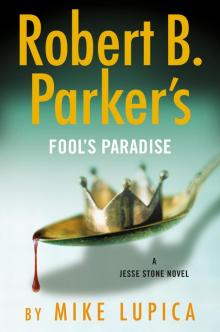 Fool's Paradise
Fool's Paradise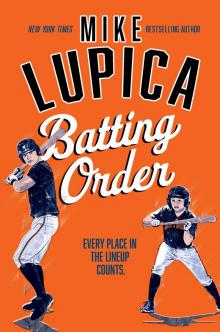 Batting Order
Batting Order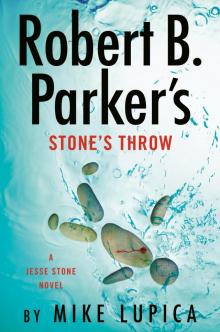 Stone's Throw
Stone's Throw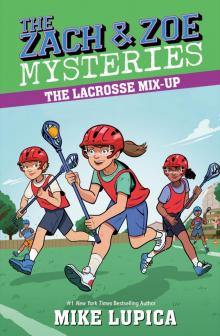 The Lacrosse Mix-Up
The Lacrosse Mix-Up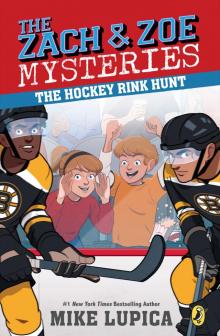 The Hockey Rink Hunt
The Hockey Rink Hunt Payback
Payback Triple Threat
Triple Threat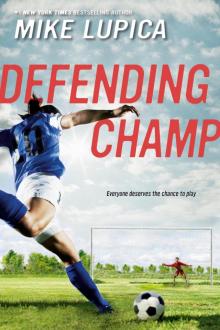 Defending Champ
Defending Champ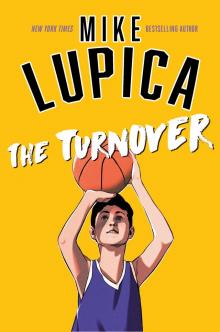 The Turnover
The Turnover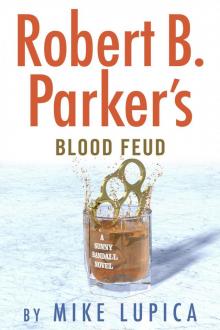 Robert B. Parker's Blood Feud
Robert B. Parker's Blood Feud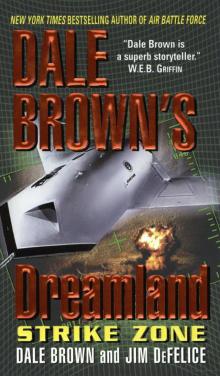 Strike Zone
Strike Zone Hero
Hero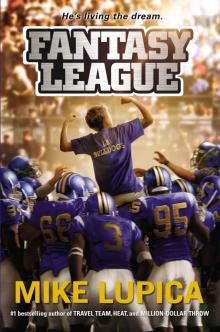 Fantasy League
Fantasy League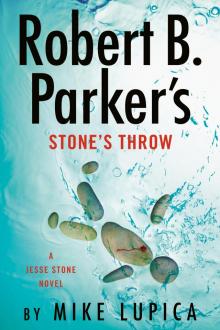 Robert B. Parker's Stone's Throw
Robert B. Parker's Stone's Throw The Big Field
The Big Field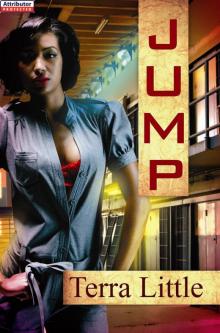 Jump
Jump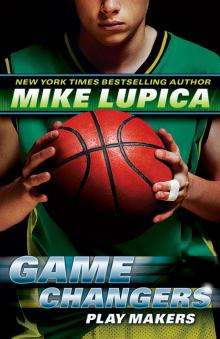 Play Makers
Play Makers The Underdogs
The Underdogs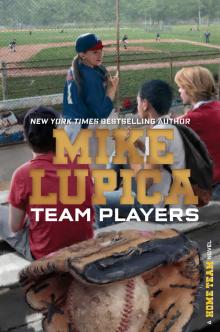 Team Players
Team Players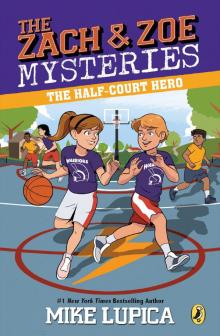 The Half-Court Hero
The Half-Court Hero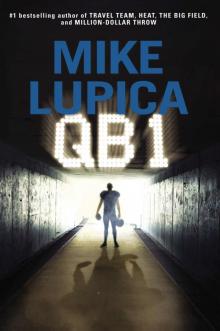 QB 1
QB 1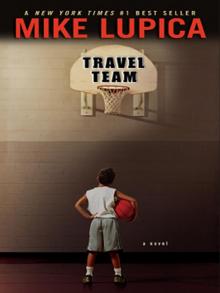 Travel Team
Travel Team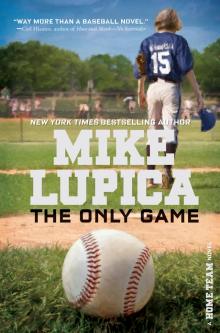 The Only Game
The Only Game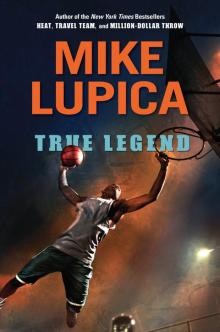 True Legend
True Legend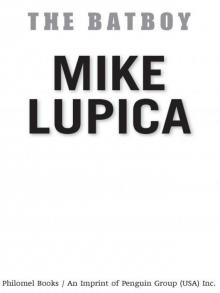 The Batboy
The Batboy Hot Hand
Hot Hand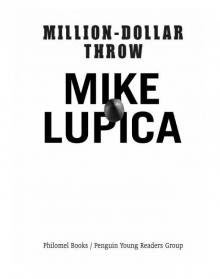 Million-Dollar Throw
Million-Dollar Throw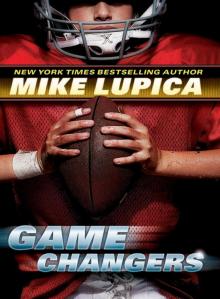 Game Changers
Game Changers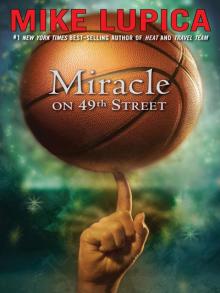 Miracle on 49th Street
Miracle on 49th Street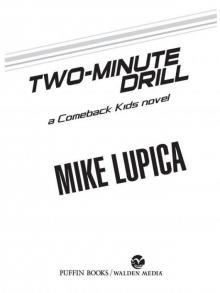 Two-Minute Drill
Two-Minute Drill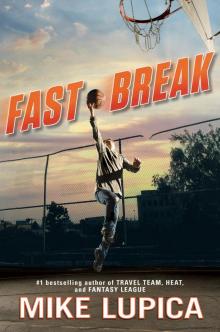 Fast Break
Fast Break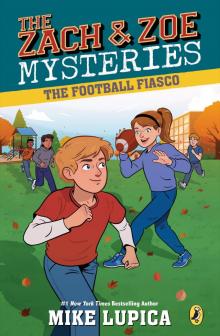 The Football Fiasco
The Football Fiasco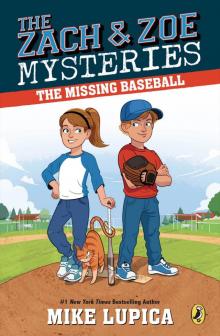 The Missing Baseball
The Missing Baseball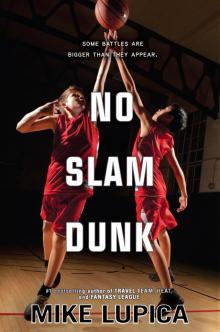 No Slam Dunk
No Slam Dunk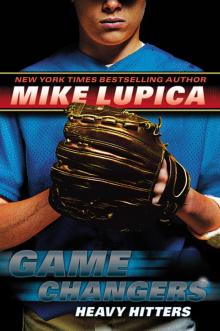 Heavy Hitters
Heavy Hitters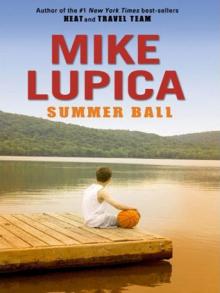 Summer Ball
Summer Ball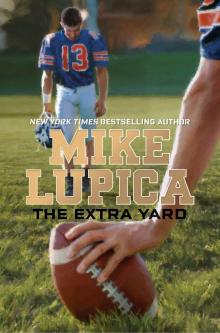 The Extra Yard
The Extra Yard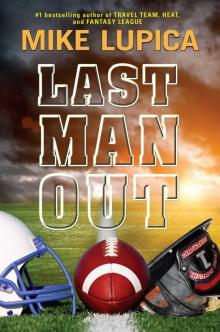 Last Man Out
Last Man Out